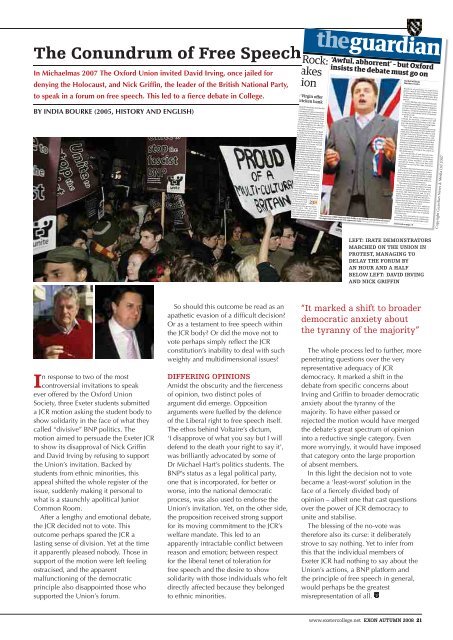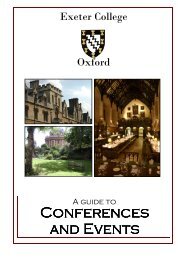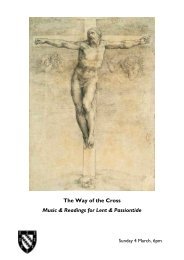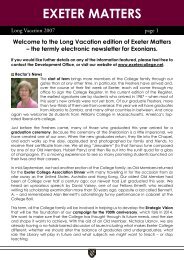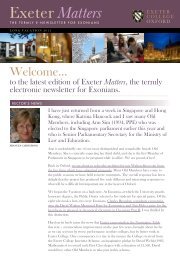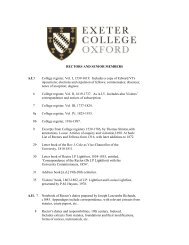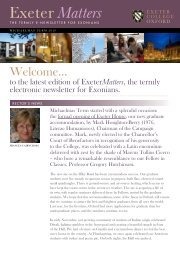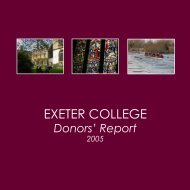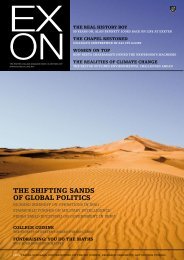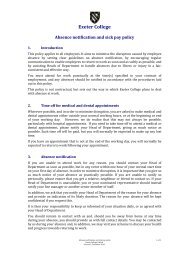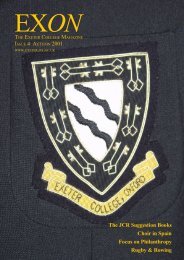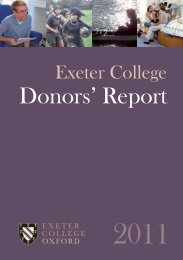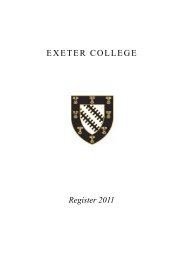2008 - Exeter College - University of Oxford
2008 - Exeter College - University of Oxford
2008 - Exeter College - University of Oxford
- No tags were found...
Create successful ePaper yourself
Turn your PDF publications into a flip-book with our unique Google optimized e-Paper software.
The Conundrum <strong>of</strong> Free SpeechIn Michaelmas 2007 The <strong>Oxford</strong> Union invited David Irving, once jailed fordenying the Holocaust, and Nick Griffin, the leader <strong>of</strong> the British National Party,to speak in a forum on free speech. This led to a fierce debate in <strong>College</strong>.BY INDIA BOURKE (2005, HISTORY AND ENGLISH) ≥Copyright Guardian News & Media Ltd 2007LEFT: IRATE DEMONSTRATORSMARCHED ON THE UNION INPROTEST, MANAGING TODELAY THE FORUM BYAN HOUR AND A HALFBELOW LEFT: DAVID IRVINGAND NICK GRIFFINIn response to two <strong>of</strong> the mostcontroversial invitations to speakever <strong>of</strong>fered by the <strong>Oxford</strong> UnionSociety, three <strong>Exeter</strong> students submitteda JCR motion asking the student body toshow solidarity in the face <strong>of</strong> what theycalled “divisive” BNP politics. Themotion aimed to persuade the <strong>Exeter</strong> JCRto show its disapproval <strong>of</strong> Nick Griffinand David Irving by refusing to supportthe Union’s invitation. Backed bystudents from ethnic minorities, thisappeal shifted the whole register <strong>of</strong> theissue, suddenly making it personal towhat is a staunchly apolitical JuniorCommon Room.After a lengthy and emotional debate,the JCR decided not to vote. Thisoutcome perhaps spared the JCR alasting sense <strong>of</strong> division. Yet at the timeit apparently pleased nobody. Those insupport <strong>of</strong> the motion were left feelingostracised, and the apparentmalfunctioning <strong>of</strong> the democraticprinciple also disappointed those whosupported the Union’s forum.So should this outcome be read as anapathetic evasion <strong>of</strong> a difficult decision?Or as a testament to free speech withinthe JCR body? Or did the move not tovote perhaps simply reflect the JCRconstitution’s inability to deal with suchweighty and multidimensional issues?DIFFERING OPINIONSAmidst the obscurity and the fierceness<strong>of</strong> opinion, two distinct poles <strong>of</strong>argument did emerge. Oppositionarguments were fuelled by the defence<strong>of</strong> the Liberal right to free speech itself.The ethos behind Voltaire’s dictum,‘I disapprove <strong>of</strong> what you say but I willdefend to the death your right to say it’,was brilliantly advocated by some <strong>of</strong>Dr Michael Hart’s politics students. TheBNP’s status as a legal political party,one that is incorporated, for better orworse, into the national democraticprocess, was also used to endorse theUnion’s invitation. Yet, on the other side,the proposition received strong supportfor its moving commitment to the JCR’swelfare mandate. This led to anapparently intractable conflict betweenreason and emotion; between respectfor the liberal tenet <strong>of</strong> toleration forfree speech and the desire to showsolidarity with those individuals who feltdirectly affected because they belongedto ethnic minorities.“It marked a shift to broaderdemocratic anxiety aboutthe tyranny <strong>of</strong> the majority”The whole process led to further, morepenetrating questions over the veryrepresentative adequacy <strong>of</strong> JCRdemocracy. It marked a shift in thedebate from specific concerns aboutIrving and Griffin to broader democraticanxiety about the tyranny <strong>of</strong> themajority. To have either passed orrejected the motion would have mergedthe debate’s great spectrum <strong>of</strong> opinioninto a reductive single category. Evenmore worryingly, it would have imposedthat category onto the large proportion<strong>of</strong> absent members.In this light the decision not to votebecame a ‘least-worst’ solution in theface <strong>of</strong> a fiercely divided body <strong>of</strong>opinion – albeit one that cast questionsover the power <strong>of</strong> JCR democracy tounite and stabilise.The blessing <strong>of</strong> the no-vote wastherefore also its curse: it deliberatelystrove to say nothing. Yet to infer fromthis that the individual members <strong>of</strong><strong>Exeter</strong> JCR had nothing to say about theUnion’s actions, a BNP platform andthe principle <strong>of</strong> free speech in general,would perhaps be the greatestmisrepresentation <strong>of</strong> all.www.exetercollege.net EXON AUTUMN <strong>2008</strong> 21


